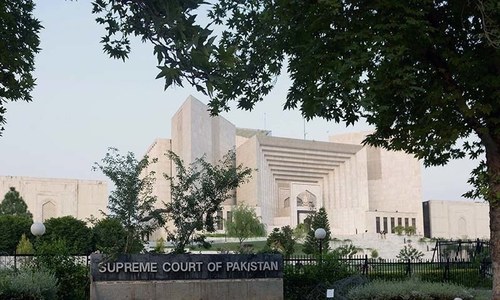ISLAMABAD: The Supreme Court on Saturday held that the Election Commission of Pakistan (ECP) lacks authority to hold a re-poll on the grounds of tampering with the election record after the consolidation of the final result of the poll by the Returning Officer under Section 95 of the Elections Act.
In the present case, the bar of exercising powers by ECP before the expiration of sixty days after publication of the name of the appellant as a returned candidate under Section 98 of the Elections Act 2017 was not attracted as the publication had been made under an interim order of the apex court, observed Justice Syed Mansoor Ali Shah in the judgement.
Justice Shah was a member of a three-judge bench headed by Chief Justice of Pakistan (CJP) Umar Ata Bandial and also consisting of Justice Ayesha A. Malik that had taken up appeals against Jan 18, 2019 notification of ECP as well as Feb 15, 2019 Islamabad High Court (IHC) order.
Justice Shah says Election Commission cannot initiate roving inquiry on ‘vague’ allegations
The judgement explained that the illegality of tampering with the election record was committed in the present case after the consolidation of the final result of the poll by the Returning Officer (RO) under Section 95 of the Elections Act.
The ECP could not have invoked and exercised its power under Section 9(1) of the Elections Act as such illegality had not affected the result of the poll already consolidated by the RO.
Besides, whether the appellant or the respondent was responsible for tampering with the election record after the consolidation of the final result of the poll, could not have been decided, nor has the matter been decided, by the ECP within the scope of summary inquiry under Section 9(1) of the Elections Act. This fact could only have been decided by the election tribunal in a full-fledged trial. Without deciding this fact, ordering a re-poll in 20 polling stations amounts to punishing the appellant, the judgement said.
“The Election Commission cannot initiative a roving inquiry to search for some illegalities or violations, on bald and vague allegations unsupported by prima facie proof, in the exercise of its jurisdiction under Section 9(1) of the Elections Act,” the ruling added.
The dispute before the apex court was whether the ECP enjoyed the power to order a re-poll in one or more polling stations or in the whole constituency under Article 218(3) of the Constitution read with Section 8(c) or Section 9(1) of the Elections Act on the ground of tampering with the election record (polling bags, ballot papers, etc) after the consolidation of the final result of the poll by RO and the publication of the name of the returned candidate in the official gazette.
Petitioner Zulfiqar Ali Bhatti and Amir Sultan Cheema (respondent) along with several other candidates had contested the general election of 2018 for the membership of the National Assembly from the constituency NA-91 Sargodha–IV.
In the poll held on July 25, 2018, the appellant secured 110,654 votes and the respondent 110,567 votes. The respondent made an application, on July 27, 2018, to RO for recounting the votes which was rejected by RO on July 29, 2018 who consolidated the final result of the poll on that day.
On July 30, 2018, the respondent filed a petition before the ECP to set aside the order of RO and accept his application for recounting the votes. The ECP by its order of July 31, 2018, disposed of the petition while directing him to approach the appropriate forum (Election Tribunal) through an election petition, for the redressal of his grievance.
Consequently, the ECP ordered a re-poll in 20 polling stations on Feb 2, 2019 and after consolidating the result of this re-poll in 20 polling stations with the result of the first poll in other polling stations, the respondent was notified as a returned candidate on Feb 19, 2019.
The judgement said the general power under Article 218(3) and Section 8(c) of the Elections Act can be exercised by the ECP within two parameters: during the election process, and when there is no express provision in the law enacted by parliament to deal with the matter.
The respondent shall be de-notified, while the appellant re-notified, as a returned candidate, the judgement said.
Published in Dawn, September 10th, 2023













































